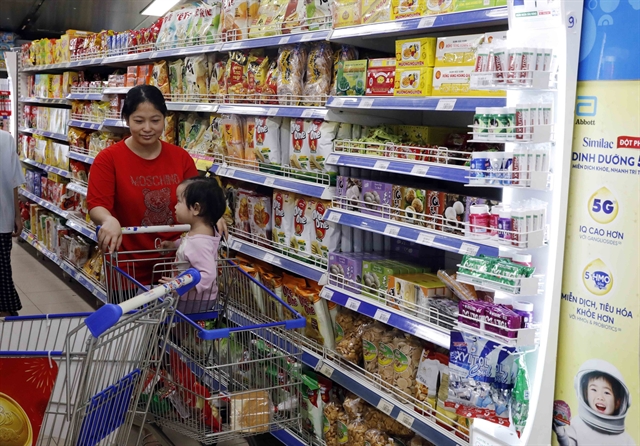 |
| A mother and a daughter choose food at Co.opmart Hà Đông in Hà Nội. — VNA/VNS Photo Trần Việt |
HÀ NỘI — Up to 72 per cent of snacks and finger foods marketed for children aged six months to three years in Southeast Asia, including Việt Nam, contain added sugars and sweeteners, a new study has revealed.
Apart from elevated levels of sugar and salt, the study also highlighted widespread usage of potentially misleading and deceptive labelling, along with a lack of stringent regulations governing product composition and sale.
The study, supported by UNICEF and partners of the Consortium for Improving Complementary Foods in Southeast Asia (COMMIT), examined more than 1,600 infant cereals, purées, pouches, snacks and ready-to-eat meals marketed for young children in Cambodia, Indonesia, Lao PDR, Malaysia, the Philippines, Thailand and Việt Nam. It also studied consumer behaviours and existing regulations in these seven countries.
The findings revealed that almost half of the products scrutinised contained added sugars and sweeteners, with this figure rising to 72 per cent among snacks and finger foods. Concerning salt content, over one-third of the products examined had higher sodium levels than recommended.
Additionally, nearly 90 per cent of product labels included potentially misleading or deceptive claims about their composition.
Lesley Miller, deputy representative of UNICEF Việt Nam, emphasised: “In Việt Nam, many commercially produced complementary foods (CPCF) on the market do not meet nutritional standards, and their labelling practices could potentially mislead parents. There is an urgent need to address significant gaps in the national CPCF regulatory framework.”
“Children and their parents deserve better options,” she stressed.
Commercially produced complementary foods have become a prevalent component of the diets of young children in Southeast Asia, as 79 per cent of mothers in urban areas report providing these foods to their children on a daily basis.
Throughout Southeast Asia, the sales of commercially produced complementary foods have witnessed a 45 per cent increase over the past five years.
The study found that about three-quarters of mothers surveyed in Việt Nam stated that they fed their children with CPCF at least once daily. The majority of these mothers purchased CPCF from supermarkets, accounting for 48 per cent of total, or baby stores, making up to 33 per cent.
In terms of regulation, the study highlighted the absence of national policies in all seven countries regarding the composition and labelling of commercially produced complementary foods that adhere to international guidelines.
Moreover, several countries were found to have no legal measures to regulate the sugar or salt content of commercially produced complementary foods. Countries with maximum sugar or salt thresholds often only applied them to certain categories, such as cereals or snack foods, and the thresholds were higher than international standards. Sugar intake early in life can lead to cavities, weight gain and poor eating habits, while high sodium intake can lead to high blood pressure, with impacts that can be lifelong.
Debora Comini, UNICEF regional director for East Asia and the Pacific, emphasised the need for governments and food producers to take a more active role in safeguarding the health of young children.
“Good nutrition in the first years of life helps children thrive, fuelling prosperous families, productive workforces and powerful economies. On the other hand, poor nutrition increases the risk of stunting, wasting, micronutrient deficiencies, overweight, obesity and disease, ultimately coming at great cost to children and their families, but also to healthcare systems and economies,” she said.
UNICEF and COMMIT partners have proposed improving government regulations for commercially produced complementary foods, including prohibiting the use of added sugars and sweeteners, limiting sugar and sodium content, and prohibiting misleading marketing and labelling.
The Governments are urged to strictly monitor national regulations on commercially produced complementary foods while supporting parents to provide a diverse array of nutritious food to their young children, and navigate deceptive marketing and labelling practices. — VNS
- Reduce Hair Loss with PURA D’OR Gold Label Shampoo
- Castor Oil Has Made a “Huge” Difference With Hair and Brow Growth
- Excessive hair loss in men: Signs of illness that cannot be subjective
- Dịch Vụ SEO Website ở Los Angeles, CA: đưa trang web doanh nghiệp bạn lên top Google
- Nails Salon Sierra Madre
 VnExpress News The News Gateway of Vietnam
VnExpress News The News Gateway of Vietnam





